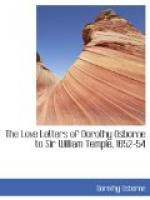Temple, when Dorothy’s thoughts reach him, must have replied with some impatience. There are stories, too, set about concerning her good name by one Mr. B., to disturb Temple. Temple can hardly have given credence to these, but he may have complained of them to Dorothy, who is led to declare, “I am the most unfortunate woman breathing, but I was never false,” though she forgives her lover “all those strange thoughts he has had” of her. Whatever were the causes of the quarrel, or rather the despondency, we shall never know accurately. Dorothy was not the woman to vapour for months about “an early and a quiet grave.” When she writes this it is written in the deepest earnest of despair; when this mood is over it is over for ever, and we emerge into a clear atmosphere of hope and content. The despondency has been agonizing, but the agony is sharp and rapid, and gives place to the wisdom of hope.
Temple now comes to Chicksands at an early date. There is a new interchange of vows. Never again will their faith be shaken by fretting and despair; and these vows are never broken, but remain with the lovers until they are set aside by others, taken under the solemn sanction of the law, and the old troubles vanish in new responsibilities and a new life.
Letter 41.—Lady Anne Blunt was a daughter of the Earl of Newport. Her mother had turned Catholic in 1637, which had led to an estrangement between her and her husband, and we may conclude poor Lady Anne had by no means a happy home. There are two scandals connected with her name. She appears to have run away with one William Blunt,—the “Mr. Blunt” mentioned by Dorothy in her next letter; and on April 18, 1654, she petitioned the Protector to issue a special commission upon her whole case. Mr. Blunt pretended that she was contracted to him for the sake, it is said, of gaining money thereby. There being no Bishop’s Court at this time, there are legal difficulties in the way, and we never hear the result of the petition. Again, in February 1655, one Mr. Porter finds himself committed to Lambeth House for carrying away the Lady Anne Blunt, and endeavouring to marry her without her father’s consent.
SIR,—Having tired myself with thinking, I mean to weary you with reading, and revenge myself that way for all the unquiet thoughts you have given me. But I intended this a sober letter, and therefore, sans raillerie, let me tell you, I have seriously considered all our misfortunes, and can see no end of them but by submitting to that which we cannot avoid, and by yielding to it break the force of a blow which if resisted brings a certain ruin. I think I need not tell you how dear you have been to me, nor that in your kindness I placed all the satisfaction of my life; ’twas the only happiness I proposed to myself, and had set my heart so much upon it that it was therefore made my punishment, to let me see that, how innocent soever I thought my affection,




